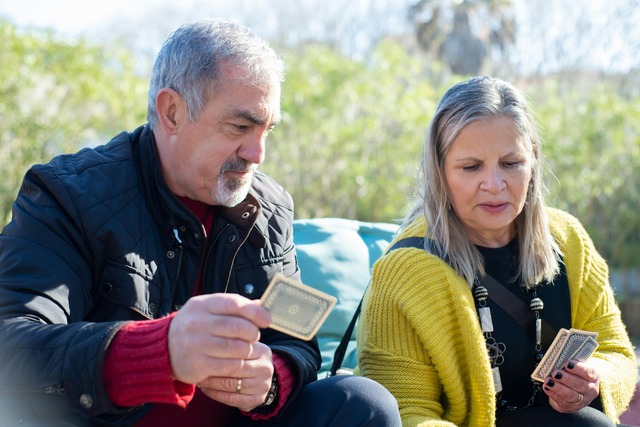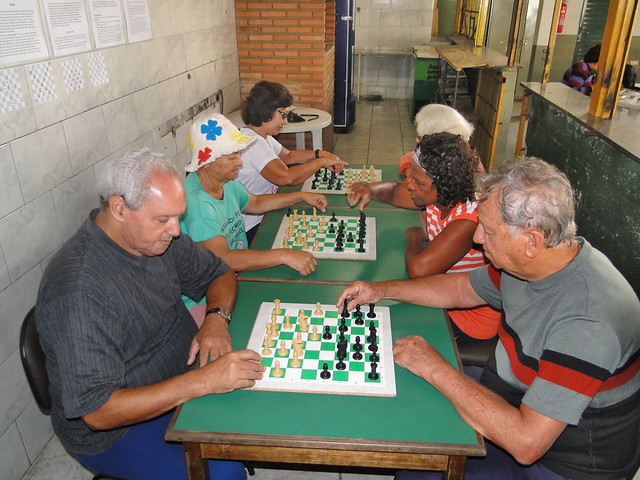According to the National Institutes of Health, 6.7 million Americans aged 65 and above are living with Alzheimer’s dementia. Dementia is a general term for a decline in mental ability that interferes with daily life. People with the condition have poor memory and are unable to perform daily activities. Harvard Health reports that persistently feeling lonely is one of the major risk factors for cognitive decline and dementia.
If you or a loved one suffers from dementia, it’s important to participate in fun and engaging games to keep your brain active. Many simple games can help slow the progress of dementia and improve memory. These include board games like Snakes and Ladders, dominoes, jigsaw puzzles, and simple card games like Snap and Bingo. Here are the best games for the elderly with dementia.
1. Word Puzzles
Many seniors enjoy word games and have been playing them since they were young. Unlike dice games, you can’t play word games on autopilot, you must think about your next move, or you’ll lose. Some word puzzles, like crosswords, focus on word recall, while others, like Scrabble, focus on letter and word arrangement.
While there’s a wide variety of word puzzles, it’s important to pick those that give you a learning experience or cognitive challenge. These will help keep your memory and your thinking sharp. When you’re regularly challenging yourself and learning, you’re exercising your brain, growing new neural pathways, and supporting old neural pathways. So don’t just pick a game that keeps you busy but one that challenges you and helps you learn.
Past research has shown that playing cognitively-stimulating games like crosswords can help improve verbal learning, memory, speed, and more. Classic word puzzles we highly recommend include crosswords, word searches, Scrabble, anagrams, and cryptograms. Word games boost attention, memory, processing speed, and verbal fluency—skills that can decline with age. A decades-long study revealed that playing non-digital games leads to better cognitive health in old age.
2. Card Games

Card games are great for seniors with dementia as they exercise brain skills such as concentration, reasoning, critical thinking, and memory, which are often affected by dementia. Play card games regularly to keep your mind sharp and maintain mental health.
The most popular card games include Rummy, Solitaire, Uno, Hearts, and Pinochle. Bingo is also a favorite among seniors because it’s simple and provides the right level of mental stimulation. It’s also a fun group activity that can be played by seniors in a care home or an assisted living facility. Bingo helps combat feelings of loneliness, boredom, and isolation, which normally affect Alzheimer’s patients.
3. Jigsaw Puzzles
Jigsaw puzzles are very beneficial for memory and reasoning. Research reveals that the puzzles exercise multiple cognitive abilities and can help protect against cognitive aging. Some Jigsaw puzzles are simple and easy to piece together, while some are more complex and require hand-eye coordination as well as memory recall.
People with dementia often have poor memory recall and reasoning, and jigsaw puzzles can help improve these skills. There are puzzles for every skill level, from cardboard jigsaws to 3D jigsaw sculptures.
4. Board Games
Playing traditional board games can help improve attention, working memory, and problem-solving skills. Modern board games, which use cards, dice, and other elements, can also improve cognitive and executive abilities.
A 2019 study showed that people who regularly played analog games, such as board games, experienced less cognitive decline between ages 70 and 79. Board games stimulate the brain because players must strategize and think critically to win. Some of the most popular board games are Monopoly, Chess, Trivial Pursuit, Cranium, and Ticket to Ride. Play a board game whenever you want to relax and unwind or spend quality time with your favorite people.

5. Dice Games
A past research study reveals that people with cognitive conditions, such as dementia, can boost their numerical and calculation skills by playing dice games. Most dice games rely on a random throw of the dice, and games like Yahtzee and Bar Dice are fun to play.
Some brain-simulating dice games for the elderly with dementia include Shut the Box, Backgammon, Bunco, Kismet, and Liar’s Dice. These games don’t require critical thinking, so anyone can play them. Simply pick up the dice and toss it, Keep the pace going and the members throwing. There’s never a boring moment.
6. Video Games
A disclaimer: we don’t recommend all video games, only those that are specifically designed to exercise the brain. There are numerous video games in the marketplace, computer games, games on gaming consoles, and even cell phone and tablet games. But not all are beneficial for the brain. No matter what medium you’ll use to play video games, take time to get the best brain training games for the elderly with dementia. Recent research has revealed that these games can boost cognitive function in the elderly, especially in the areas of attention, visual memory, and visual recognition. Some video games we recommend include TETRIS, word games, puzzles, card games, dice games, and board games.
7. Bonus: Coloring
Coloring is no longer a childish activity. It helps decrease agitation and anxiety, relaxes the brain, and quiets the mind. As you color, you focus on the activity, which relaxes your mind and helps keep stressful thoughts at bay. Coloring can also improve brain functioning as it activates different parts of your brain’s cerebral hemispheres. More complex coloring designs improve hand-eye coordination and motor skills.
Recap
Dementia significantly affects a person’s cognitive abilities—memory, thinking, reasoning, language, and more. People with dementia find it difficult to perform day-to-day activities, such as bathing, dressing, walking, using the toilet, and eating.
Memory games for dementia can help alleviate symptoms and improve quality of life. So, start playing these games every day to stimulate your brain and maintain mental health. You’ll truly enjoy getting older.

Alice is a writer and editor for Gainful Retirement. She is passionate about helping retirees live fulfilling lives without financial constraints. She puts a lot of time and effort conducting market research to identify common issues faced by retirees. Her passion is to help you enjoy retirement and solve the most pressing issues you face.
